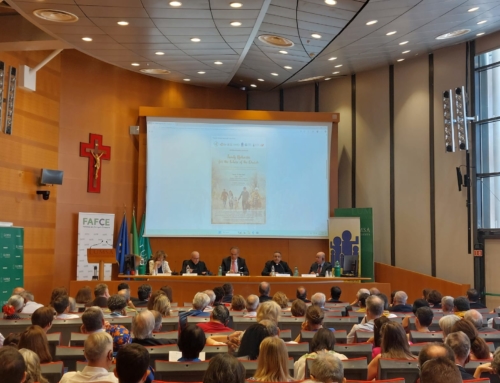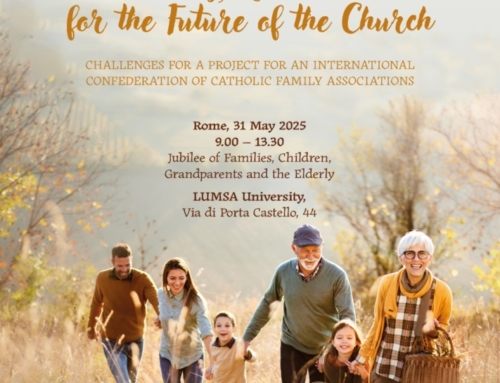10th of July 2023
On the 8th of June 2023 FAFCE participated in the stakeholder consultation organised by the EU Committee of the Regions in view of preparation of opinion “Stopping gender-based violence – cities and regions leading the way”. FAFCE Senior Policy Manager and Research and Policy Assistant joined two different groups focusing respectively on education and spreading awareness, and on prevention. Both groups presented the result of their discussions, enriched by FAFCE insights. Following the event our Federation submitted a written contribution that highlighted:
- the preventive role of the family
- discriminatory practices at work: maternal mobbing
- violence in online pornography and the promotion of harmful stereotypes
- surrogacy as a situation of reproductive exploitation
- the role of civil organisation, particularly family associations, in the prevention of violence against women
FAFCE also brought several concrete recommendations to the attention of the Committee of Regions:
- to legally recognise the value of unpaid family care work as a particular category of work as a way to fight gender-based stereotypes and discriminatory behaviour against parents and mothers;
- to implement efficient means to remove any harmful online content, including pornographic, protect children from exposure to online pornography, and raise awareness on the harmful impacts of pornography consumption for adults;
- to work for an international instrument to ban the practice of surrogacy, as a situation of reproductive exploitation, commodification of children and human trafficking.
Contribution of the Federation of Catholic Family Associations in Europe on “Stopping gender-based violence – cities and regions leading the way”
How to prevent violence: the preventive role of the family
The best approach to reducing and eliminating violence is one focused on prevention. To prevent violence against women most efficiently it is crucial to focus firstly on ensuring that every citizen has the right environment to grow up and live in, the one that teaches children mutual respect from the start and allows them to avoid negative impacts on their future social behaviour.
Families can play a major part in this prevention-centred approach. The family is the first school of proper conduct and the primary agent of socialisation for children, as well as an ongoing witness to the fact that women and men can not only live together peacefully without violence, but also in respect and love.
In addition, parents provide their children with moral and intellectual edification that prepares them for civic and social life. They have the primary responsibility to warn their children about harmful gender stereotypes and violence by modelling appropriate and loving behaviour, respectful of the differences in sex. They can also contribute to school education through parent associations.
By creating a safe space, family provides its members with the support needed to overcome traumatic experiences, encourages the victim to report a crime, as well as fights for their rights, especially when the victims find themselves unable to handle the situation. Family members may also act as a trusted person in difficult situations, as someone to lean on and talk to, and share advice on how to proceed.
In addition, our Federation would like to draw the attention of the Committee of the Regions on some specific situations of violence against women, and to call for action in that regard:
Discriminatory practices at work: maternal mobbing
Violence against women also includes gender-based harassment and violence against mothers in the workplace. Women’s ability to be pregnant and give birth to children fuels a gender stereotype that pregnancy and childbearing compel women to behave differently than men in negative ways. Motherhood changes the way in which women are perceived as workers in terms of expected work focus, with work absences due to maternity leave, proficiency and commitment, which creates a ground for discriminatory practices and health-harming abusive conducts at work targeting women wishing to have children, pregnant women and mothers.
Maternal mobbing includes refusal to recruit, lower salaries to compensate for the perceived “risk”, detrimental changes in the terms of the contract of employment upon return from maternity leave, harassment and even dismissal. Equal pay for equal work is key for non-discrimination of women in the workplace. In the European Court of Justice’s Webb v EMO Air Cargo case, a pregnant woman was dismissed when she tried to take maternity leave because she had not disclosed the fact of her pregnancy during the hiring process.
Support for pregnant women is a crucial condition to prevent situations of poverty and women’s social exclusion, which increases their vulnerability to violence and to abortion. Moreover, equality between men and women cannot be achieved if maternity is not central in social and labour policy. Women are often afraid of getting pregnant as they would be discriminated against in their workplace or they fear that their quality of life would drastically change.
In addition to abolishing discriminatory behaviour at the workplace, there is a need to prevent the expulsion of pregnant girls from schools, facilitate education for pregnant women and girls as well as ensure that they can smoothly enter the labour market. Access to services and rights when undergoing a pregnancy, regardless of amount of work time completed, such as maternity leave, protection against discrimination, harassment, and dismissal from work or school, is key.
Our Federation also encourages EU Member-States and local authorities to legally recognise the value of unpaid family care work as a particular category of work. This would have a positive influence on fighting gender-based stereotypes and discriminatory behaviour against parents and mothers.
Violence in online pornography and the promotion of harmful stereotypes
One of the means of prevention at an early stage should also include restricting access to pornography, especially for minors. It cannot be denied that it greatly feeds into the continuation of harmful sex stereotypes and it has an undeniable impact on the promotion of offensive sexual behaviour against women. An analysis of the 50 most popular pornographic videos showed that 88% of scenes contained physical violence, and 49% contained verbal aggression. Moreover, 87% of acts of aggression were perpetrated against women, and 95% of their responses were either neutral or expressions of pleasure. In pornography, no mention is made on consent or mutual respect.
Exposure to pornography is significantly correlated to the belief that women are sexual objects and that male dominance and female submission are expected gender roles. This correlation calls for concrete measures of restricting access (especially that of minors) to pornography in order to discourage and reduce the demand that fosters all forms of exploitation of women, and to protect minors, both girls and boys, of a sexually violent childhood or adulthood.
Policies on illegal and harmful gendered content should include an automatic detection, reporting and removal of violent content, especially perpetrated against women and girls. Regarding pornographic content, it is crucial to not only include the physical violence, but also the symbolic violence portrayed in such content, such as humiliating sex performance.
Our Federation calls to implement efficient means to remove any harmful online content, including pornographic, protect children from exposure to online pornography, and raise awareness on the harmful impacts of pornography consumption for adults.
Surrogacy as a situation of reproductive exploitation
Situations of exploitation do not only limit themselves to sexual exploitation, but also reproductive exploitation, such as in surrogacy arrangements. Surrogacy indeed entails the commodification of women’s bodies for reproductive purposes and the selling of children. This practice was repeatedly condemned by the European Parliament, for instance in the Resolution of 21 January 2021 on the EU Strategy for Gender Equality (2019/2169(INI)).
In practice, surrogacy means the exploitation of poorer women for the purposes of providing a child to richer couples. Surrogate mothers are often in situations of vulnerability, facing economic difficulties, and come to sell their body and their reproductive functions in order to support themselves and their family. In addition, the procedure of surrogacy implies medical risks, such as the common lack of post-natal care and an increased risk of postpartum depression, risks that only surrogate women carry, including death.
Our Federation calls for the European Union to work for an international instrument to ban the practice of surrogacy, as a situation of reproductive exploitation, commodification of children and human trafficking.
The role of civil organisation, particularly family associations, in the prevention of violence against women
The pandemic and the lockdown did not create domestic violence but rather intensified some of the conditions that lead to domestic violence. These include increased unemployment, psychological distress, isolation, the de facto imprisonment of persons in their own homes, the closure of shelters, and additional difficulties for violence detection by associations helping victims of violence.
The prevention of violence against women on the European and national level must be backed up by relevant actors at the regional and local level, which includes non-governmental organisations and networks of persons, such as families. Families and family associations provide a network of support for victims of violence, able to support and equip victims to escape situations of violence.
Firstly, they help in the identification and response to violence. It can prove difficult for victims to recognise and admit their own victimhood. Families and family associations are an essential resource for recognising family members that might be abused, go missing and are hard to speak to or rarely seen anymore. In case of violence, victims can escape to their family members or to a shelter to hide.
Family associations play a key role when the violence comes from within the family. They are relevant intermediaries, able to support and equip victims to escape situations of violence, as well as help to fight deeper causes of violence, such as situations of loneliness, social exclusion, and the precarity of families or family members, which are causes of violent tendencies. Overall, family associations also have a concrete role in education, prevention, as well as training and support to families, via networks where families themselves can support each other.







